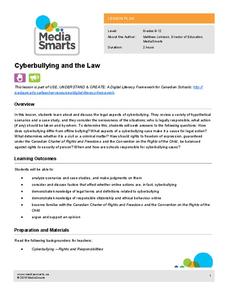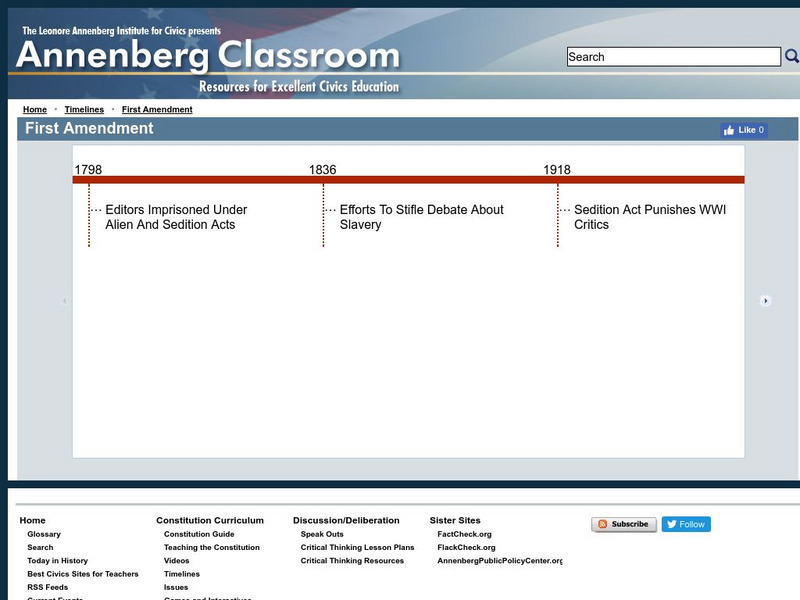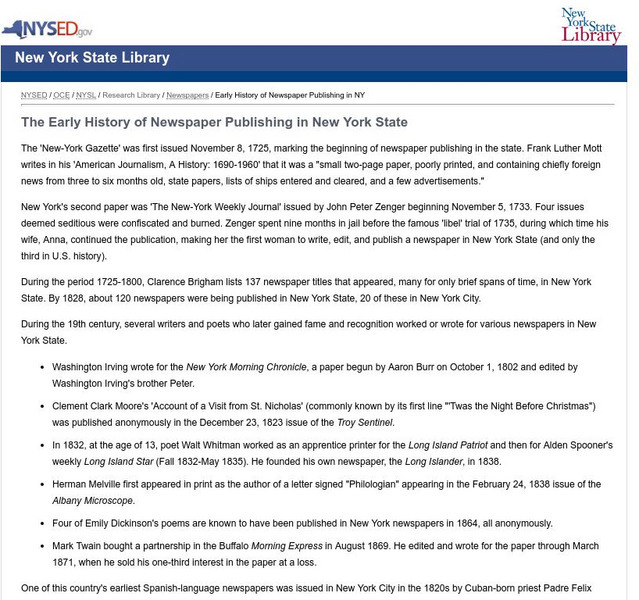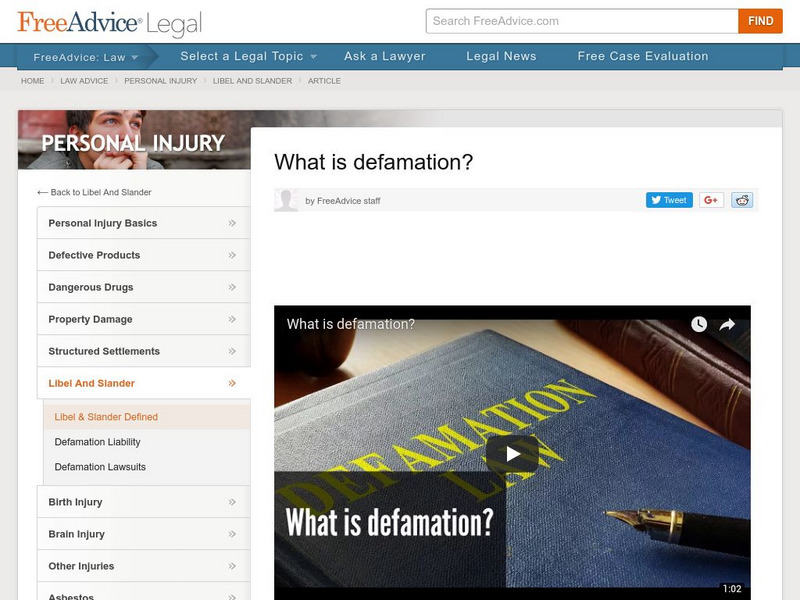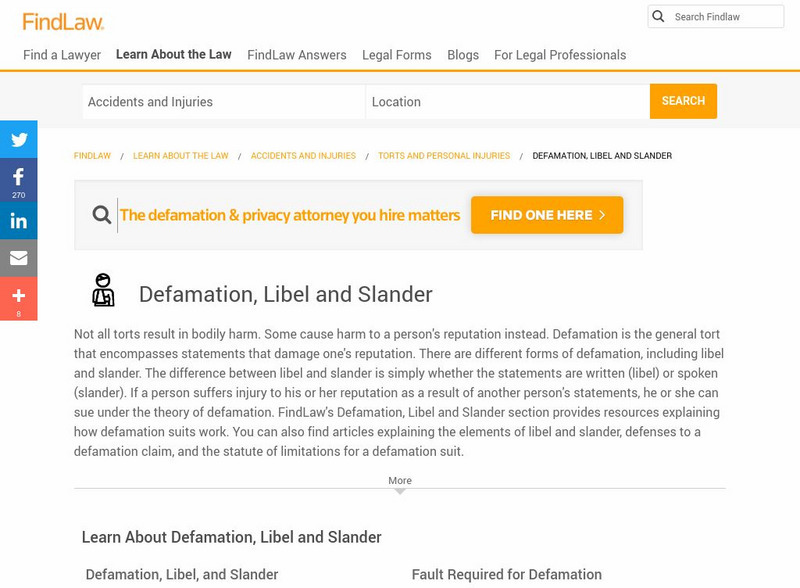Social Media Toolbox
Law Review
How can your journalism class ensure they use social media responsibly and legally? The sixth lesson in a 16-part Social Media Toolbox series asks pupils to dig deep into the legal aspects of social media use by school publications....
Fluence Learning
Writing an Argument: Free Speech
How do you assess whether pupils have mastered certain concepts and skills? Designing a performance task that asks learners to demonstrate their skills and providing writers with a rubric that identifies these skills and provides...
Alabama Department of Archives and History
New York Times Co. v Sullivan: The Alabama Case that Changed Libel Law
Malice aforethought? Can the New York Times be held libel for false claims appearing in its ads? The Supreme Court case New York Times v Sullivan changed the interpretation of the First Amendment. Class members examine these changes and...
Media Smarts
Cyberbullying and the Law
Research, role-playing, and reflection are the three “R’s” that form the basis of an examination of Cyberbullying. Although based on the Criminal Code of Canada, the included scenarios and case studies provide valuable resources for a...
Curated OER
Law & Ethics for Photojournalists
Students identify and discuss First Amendment rights, examine how to make sound legal judgements regarding photographs of private individuals, examine difference between public and private figures as far as libel law is concerned,...
Curated OER
The First Amendment, What it Means and When Libel Comes in to Play
Students research three topics: The First Amendment, John Peter Zenger and his trial, and libel. In this journalism and libel lesson, students discuss things authority figures have done they disagree with and the anit-sedition law....
Curated OER
Worksheet #56 Questions - Judicial Terms
For this American judicial terms worksheet, students examine their knowledge through ten fill in the blank questions that relate to the aforementioned topic.
US National Archives
Our Documents: The Alien and Sedition Acts (1798)
The Alien and Sedition Acts were passed by Congress in 1798 because of feared war with France. This engaging page gives you the opportunity to see a complete copy of the original document and also gives links to a typed transcript,...
University of Missouri
Famous Trials: John Peter Zenger Trial
This is a comprehensive site from UMKC School of Law concerning the trial of John Peter Zenger. You can find just about any information you may need here, from the issues of The New York Weekly Journal to the trial record. Also of...
Independence Hall Association
U.s. History: Alien and Sedition Acts
A great description of the Alien and Sedition Acts, passed by the Federalist Congress in 1798. See how the Federalists tried to hang on to power by restricting voting privileges and infringing on free speech and freedom of the press.
Other
Student Press Law Center Legal Brief: Libel Law
Excellent site for students that need to know more about libel laws. Includes a definition of libel, a process to go by in order to avoid a lawsuit, and your defense options if you happen to be involved in a lawsuit.
Investopedia
Investopedia: Cease and Desist
Understand the legal term "cease and desist," why it is used, and what the difference is between a cease and desist order and a cease and desist letter.
University of Hawai'i
University of Hawaii: Business Editors Ethics Code
The official ethics code of The Society of American Business Editors and Writers provided for by the University of Hawaii.
Annenberg Foundation
Annenberg Classroom: First Amendment
Check out this interactive timeline on first amendment of the United States Constitution.
Annenberg Foundation
Annenberg Classroom: Freedom of the Press
Check out this interactive timeline on the history of freedom of press in the United States.
Thomson Reuters
Find Law: u.s. Supreme Court: New York Times v. Sullivan (1964)
Provides a brief summary and the text of Chief Justice Brennan's opinion of the Supreme Court in this case involving libel.
Independence Hall Association
U.s. History: Beginnings of Revolutionary Thinking: Trial of John Peter Zenger
Freedom of the press? That was not always an accepted right. Read about the trial of John Peter Zenger, who was accused of libel for printing truths about the royal governor of New York. Find out the outcome of the trial and what it...
Digital History
Digital History: The Emergence of New Ideas About Personal Liberties
American colonists expected to have "English rights" as supported by the Magna Carta and the English Bill of Rights. See how these rights were applied in the trial of John Peter Zenger, whose acquittal reflected the right of freedom of...
Varsity Tutors
Varsity Tutors: Archiving Early America: Alien and Sedition Acts
This article from Archiving Early America provides an explanation of the Naturalization, Alien, Alien Enemies and Sedition Acts, shows the original acts and provides transcribed texts of the Alien Enemies and the Sedition Acts.
Other
The Ethical Spectacle: Libel and Slander
This site provides a brief definition of libel and slander.
Other
Beginning Reporting: Libel and the Reporter
This site offers a definition of libel and some easy -to-follow explanations of how this might apply in various situations.
Other
New York State Newspapers:the Early History of Newspaper Publishing in N Y State
In the first few paragraphs of this article read about the first two colonial newspapers published in New York.
Other
Free Advice Legal: What Is Defamation?
The term defamation is defined and briefly discussed here. More information can be accessed from this resource on libel and slander.
Thomson Reuters
Find Law: Defamation, Libel, and Slander
An introduction to the legal definition of defamation.





